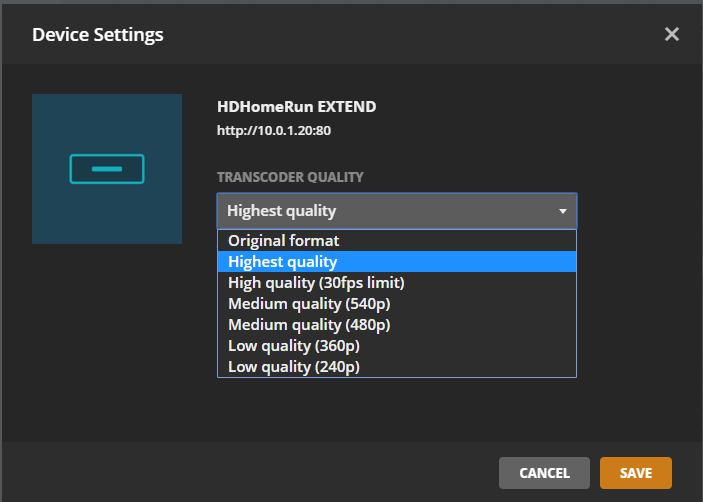Current setup, Zotac Nano with AMD A6 Quad Core 1.0ghz, hardwired to a gigabit switch. Same goes for my HD Homerun Extend (on gigabit switch. For my Plex players, I have a Roku 3 and Roku Ultra hardwired from gigabit switch.
I’ve noticed quite a bit of buffering taking place while watching Plex Live TV. I have considered boosting up my Plex server since it’s a simple Zotac Nano, however I was wondering if anyone could give me input if upgrading to something like an 8th Gen i7 would truly make a difference? I’ve tinkered with the settings in both the Roku and HD Homerun, to no avail. I understand there will be transcoding since OTA is typically done in the MPEG-2 format, so is the Nano not able to keep up? Keep in mind, while watching TV, no other streams are taking place and if they are, one other stream is a direct stream to another player.
Although I don’t believe this is a factor (since I don’t really access Plex remotely), I currently only have DSL at my home with a 6mbps download and 0.5mb upload speed.
Doesn’t the HD HomeRun Extend already do hardware transcoding to compress the MPEG-2 video stream, to make it easier on streaming? Currently I’m using and old HDHomeRun Dual, with Plex Media Server installed on a Dell Latitude 6420 with a i5 and i seem to be able to stream OK in the house. I’ve even tried streaming remotely from work and it did work, but it would stop to buffer every now and then. I was thinking of upgrading to an HDHomeRun Extend for the hardware transcoding
Yes the Extend will transcode provided in Plex you have the Transcode setting for the device set to at least Highest Quality.
Highest Quality will transcode mpeg2 to h264 before sending to Plex. High Quality will also transcode mpeg2 to h264 but will also deinterlace the video so 1080i stream will be delinterlaced. Unfortunately the Extend when deinterlacing will also convert the stream to 720p from what I understand. All my clients can handle the interlaced content so I leave mine set on Highest Quality.
so if you upgrade to a i7, where you thinking of transcoding to a lower quality for the roku to handle it better?
I guess what i’m trying to figure out is if the hdhomerun is doing hardware transcoding, then is plex even doing any transcoding at all. If you check on your Zotac Nano, is the CPU peaking during streaming of live tv?
I’m puzzled as well. I picked up the Extend because of the ability to transcode its self, which is why I don’t get the buffering I’m experiencing. I will double check my settings in the Extend and report back, though I’m pretty sure I have it set to highest quality.
Just checked my Extend and noticed the quality settings was set to “High” not “Highest.” I’m not sure how much of a difference that will make, but to try and help you out jrbilodeau, I’ll test this setting for the next few days and report back.
I was just curious how much CPU is being utilized (if any) while watching TV since I have the Extend. Since my server is running off a NUC, I don’t typically access it locally, rather remotely from another computer in my house so I don’t monitor CPU utilization.
So I’ve done some tests. Not really sure where I am at with this, as I am still having some issues, just not as much.
- I’ve verified my OTA signals are good-great
- Verified HD Homerun setting in PMS is set to ‘highest’
- Made sure nothing else was running on PMS (i.e. other streams whether local or remote)
Windows task manager still shows Plex transcode process running. Not only that, it is running between 83-99%
To verifiy I have no other tasks running in PMS in the background. When I stopped the playback of the live TV stream the plex transcode process (per Windows Task Manager), stopped.
I know I have a fairly weak, passively cooled PMS, using a Zotac Nano, however I purchased the HDHR Extend for the very reason I was given the impression the Extend would handle the bulk of the work, by transcoding the raw MPEG-2 feed to H264.
Now when I try to view a live TV feed on my Galaxy S8, running Oreo, PMS shows no transcoding being done, instead direct play. (I’m viewing this on the home screen of PMS, where it shows what streams are being spit out.
I could be missing something, but it seems to me there is something with the Roku players ability to handle MPEG-2.
I’ve seen some other posts with similar issues as mine, however no one has been able to provide a real clear-cut answer. What’s even more frustrating is I was looking into upgrading my old 2014 Samsung smart tv, with a TCL Roku TV.
Refer back to my previous post above:
At Highest Quality setting in Plex the Extend will transcode the mpeg2 video to h264 but does not remove any interlacing. So a 1080i video stream will be converted from mpeg2@ 1080i to h264 @ 1080i. If the Roku cannot handle the interlacing then the Plex Media Server must transcode to remove the interlacing.
At High Quality setting in Plex the Extend will transcode the mpegs2 video from h264 and remove the interlacing.
At Highest Quality when trying to view Live TV using my Roku Stick I get terrible buffering every few seconds. At High Quality I can watch the same video with buffering only occasionally. Luckily the Roku Stick is not my primary device, I only use it when I do any testing.
roku doesn’t support mpeg2, even on the tv’s.

